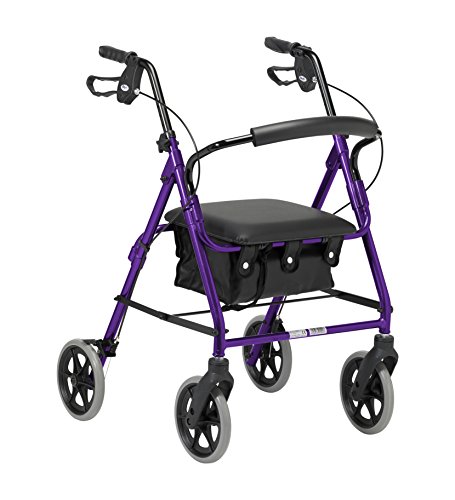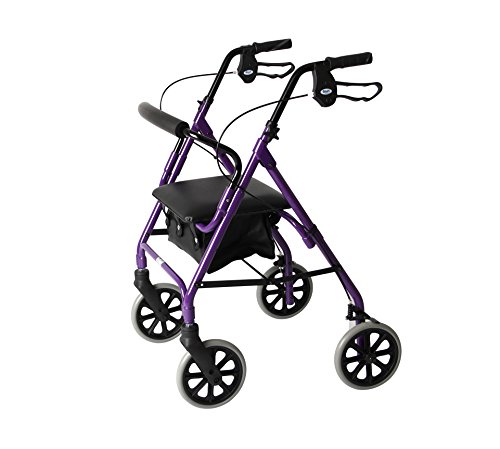What's The Current Job Market For Small Rollator With Seat Professiona…
페이지 정보
작성자Nydia 댓글댓글 0건 조회조회 15회 작성일 24-09-19 10:08본문
 small rollator with seat (click the next web page)
small rollator with seat (click the next web page)A small, compact rollator with a seat is a mobility aid that was designed to help you walk more comfortably. They usually come with four wheels, a seat and hand brakes with locking loops.
They fold down into a compact size, so they can fit into the trunk of your car or the overhead bin of an plane.
Mobility Boosted
A small rollator with seat can make a huge difference in the mobility of people who must move quickly. They can assist people in getting from one place to another faster than standard walkers, and are typically more easily maneuverable in tight spaces thanks to their compact design.
A compact, lightweight model can be easily carried in the trunk of a car or even carried in the backseat. A lot of these models feature hand brakes for additional stability and security. This kind of mobility aid can be beneficial for those suffering from arthritis, fibromyalgia or other chronic illnesses that impact balance and stability.
They are lighter than bariatric models due their smaller design. They can weigh anything from 10 lbs up to 15 pounds. They are ideal for travel. Additionally, they can be easily folded and stored away when not in use, which will save space at home or when on the move.
Smaller rollators with seats come with a built-in chair that allows users to sit down whenever they need to. This reduces fatigue during long walks as it allows the user to take breaks. Some models, like the EZ Fold-N-Go offer a front organizer bag, as well as two storage bags to make it more convenient.
These aids to mobility also conserve energy since they do not require as much force for them to move as the traditional walker. This will prevent the user from becoming exhausted faster and could also prevent accidents, since they won't have to continuously lift and put down their aids for mobility.
These small mobility aids are also capable of holding a higher weight than normal walkers. This is because they don't have to support as much of the weight of a person while moving forward or backward. This can increase stability and help prevent the user from tripping or falling while going upwards or downwards on a staircase or uneven terrain.
Stamina Increased
Rollators let you take breaks from walking when required, which increases stamina and decreases fatigue. This is especially useful for those who aren't strong enough to support a traditional walker, or who require a space to rest and relax during longer trips. Some rollators are also equipped with a backrest for additional support when sitting.
While the main features of the rollator are determined by its weight and size capacity, there are many options to add accessories to customize the user's experience. Side bags and baskets for instance, can be used to transport and store items that are often utilized outside of the home, such as medications, food, and drinks. This eliminates the need to take a risk of falling by reaching overhead or from behind to retrieve an object, which could lead to more anxiety and frustration for the user.
The ergonomic design of the rollator's handle helps in its user-friendliness. Handles that are properly positioned and easy to grip are essential for people with arthritis or weakening their hands. Many rollator models feature height-adjustable handlebars which can be set to different positions to suit the user's needs. This feature is particularly useful for those with arm or shoulder injuries. It can reduce the strain caused by bent over to pick something up from the floor.
In addition to comfort, other factors to be considered when choosing a rollator include its stability and maneuverability. A reliable collapsible rollator with seat should be able to keep its position and not shift or tilt when being pushed. Additionally, it should be equipped with brakes that are simple to engage and disengage. The tight turning radius of a rollator could allow it to be maneuvered in cramped spaces, such as a narrow aisle in a grocery store.
Some rollators with seat are lightweight, foldable and designed to travel with the user. They can be folded up and put in the back seat or trunk of a car, and removed when you're ready to walk again. They can also be brought to public transport as they fold easily and can be put away in the luggage compartment.
Convenience
A compact rollator with seats is a good option for users who require mobility that is beyond the scope of a walking cane or walker. These kinds of aids are able to aid those who have balance and mobility issues to regain their independence, however they are often too heavy for those who require greater flexibility. These smaller and narrower walkers are also referred to as petite or compact rollators or junior walkers, are optimized to cater to the needs of short individuals and offer a range of features that make them more suitable to use in everyday life over their larger counterparts.
These special walking walkers are smaller and have smaller frames and wheels. They can move more easily through narrow spaces than the conventional models. Some come with built-in seats that provide a place for people to relax and sit to increase their stamina and endurance, allowing them to break up long walks into smaller parts. These models are lightweight, making them easier to travel with. They are easy to fit in the back of the car or trunk.
Many Walker models include a variety of accessories that can be purchased separately. These include things like carrying bags or baskets that are put under the seat. (Three wheel rollators typically have them between the rear wheels). These accessories make it simple for people to transport food drinks, personal items, or other things while using the device. Accessories that allow hands to be free are readily available, including cup holders and oxygen tank holders for those who require a little extra help breathing.
There are also smaller walker-rollers for those who prefer a minimalistic method of mobility. They don't have seats or frame, but instead an arm-rest to which the user can hold their arms. They're not as effective, but can still be useful to those who have difficulty standing on their feet or lifting heavy items that could otherwise burden a regular model walker. These walker rolls are also known to be cheaper than standard walker models, making them more accessible for budget-conscious shoppers.
Safety
A small rollator with seating is a practical and safe mobility aid for those who require assistance in getting around. It assists them in staying on their feet longer, which reduces the risk of falls and injuries. The padded seat provides comfort and support for the user, making it easier to walk longer distances. It also lets them relax and rest when they're exhausted. Look for locking brakes, a lightweight design and other safety features.
Some manufacturers offer additional accessories that can enhance the comfort and ease of use for example, a storage basket or a pouch in front of the seat. These accessories let users conveniently store personal items that are accessible while using the rollator, making walking more secure by reducing the need to bend and reach for items. Some models also have the ability to fold, which allows the device to be collapsed and easily moved into a car or trunk when not when not in use.
Wheel size is another important factor to consider when choosing a smaller rollator with seat. Smaller wheels (6" or 7") provide a tighter turn radius and are perfect for indoor use. Larger wheels, on the other hand, provide an easier ride for outdoor use on rough or uneven terrain.
The handle height is also important to be considered for safety. Most rollators come with adjustable handles that can be adjusted according to the user's needs. To determine the ideal handle height for you, stand straight in your normal shoes and take a measurement of the distance between the floor to the middle of your wrist.
A good guideline is to choose a height for your handle that is comfortable for you to push the wheels of your rollator without straining or bend your arms too much. Once you have decided on the appropriate height for your handle, make sure to secure the brakes prior to trying to sit down on your rollator. You can alter the speed by locking the brake levers once you are seated, but do not release until you're up.

댓글목록
등록된 댓글이 없습니다.
